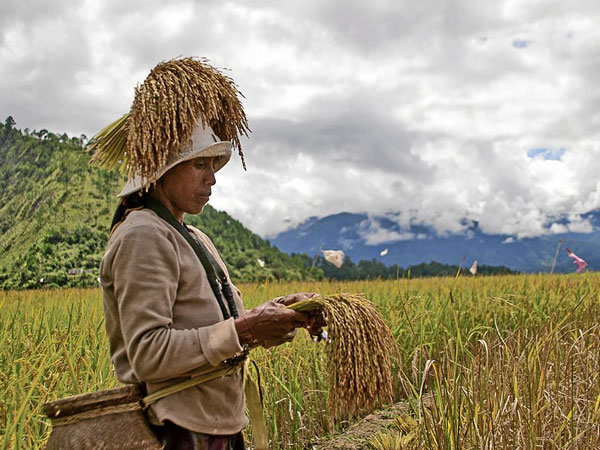
A WOMAN from the rice terraces of Maligcong in Mt. Province harvests rice by hand. The campaign for indigenous peoples’ rights and ancestral land rights was loudest in the upland Cordilleras back in the 1980s and 1990s. The uplands have benefited recently from ancestral land titles. RICHARD BALONGLONG/INQUIRER NORTHERN LUZON
Land titles issued to tribal communities have effectively reduced the country’s forest lands to less than 9 million hectares from more than 15 million ha, according to Environment Secretary Ramon Paje.
In a news briefing after his presentation of the Department of Environment and Natural Resources’ (DENR) P23.6-billion budget for 2013, Paje said the issuance of certificates of ancestral domain titles (CADT) and certificates of ancestral land titles (CALT) has converted forests to alienable and disposable lands.
“The titles issued already cover 4.27 million ha. And these cover mostly, if not all, the primary or secondary forests. Meaning, our forests have been titled into what you call CADT or CALT,” Paje told reporters.
“What we are asking Congress is whether this is already alienable and disposable land because it’s already covered by titles … If these are already titled, then we will now declare that the forest land in this country is only around 8 million or close to 9 million [ha],” he said.
“That is a drastic reduction of our forest land,” Paje added.
He said, under the Constitution, the country’s land is classified into alienable and disposable, and forests.
Alienable and disposable lands, which constitute 14.2 million ha, are subject to ownership and land titling.
Forest lands, including protected areas and national parks, measure P15.8 million ha and are not subject to commerce.
Sen. Franklin Drilon, chair of the Senate committee on finance that heard the DENR budget yesterday, said he wants a review of the Indigenous Peoples’ Rights Act because the National Commission on Indigenous Peoples’ issuance of the titles gives indigenous peoples, or IPs, the right to own forested land.
“The legal situation is that under the Constitution you cannot title forest land,” Drilon said.
“Consequently, the holders of the title can claim that they are entitled to cut the forest, to issue permits to mine, to give licenses for the use of water resources,” he said.
“We’re not depriving the indigenous peoples of their rights but we must view this in the context of the entire nation and not just of one or two tribes,” Drilon said.
At the hearing on the DENR budget, Paje said Renato Miranda, a retired Marine general who now heads a task force on illegal logging, will remain the task force’s head following reports linking Miranda to illegal logging.
Paje said, while he felt that Miranda’s meeting with wood producers in Caraga region was “an error in judgment,” he didn’t see anything irregular in the meeting since it was monitored by the DENR.
Paje added that since Miranda played a key role in the confiscation of 13 million board feet of illegal logs, “I don’t know how [he] can be an accomplice” since the haul effectively deprived illegal loggers of income.
In the same hearing, Paje said, after President Aquino signed Executive Order No. 23 calling for a total logging ban nationwide, the number of illegal logging hot spots “from Apayao to Cotabato” dropped from 197 to 28.
DENR, however, is studying whether to exempt IPs dependent on tree cutting for livelihood from the log ban.
Responding to letters and endorsements from the Ifugao government, DENR has discussed plans with Ifugao Rep. Teodoro Baguilat Jr. to issue a new directive on how IPs may buy or extract timber under strict government monitoring.
Ifugao Gov. Eugene Balitang said the provincial government has sought an exemption for its wood-carving trade, which is a regulated wood-based industry.